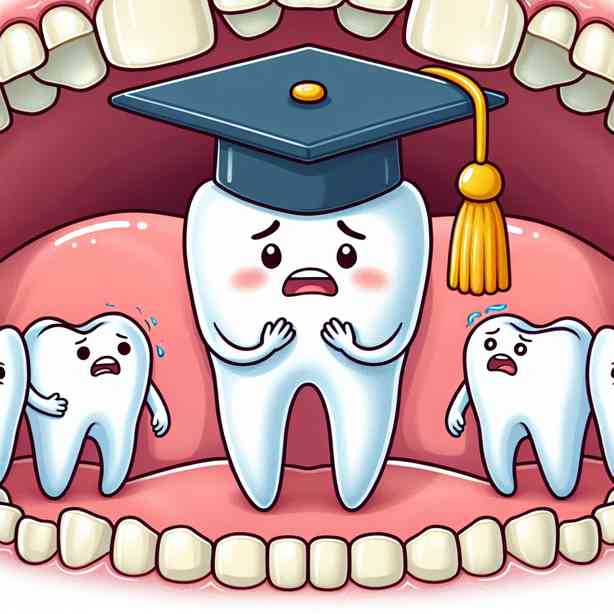
Wisdom teeth, also known as third molars, are the last set of teeth that typically emerge in late adolescence or early adulthood, generally between the ages of 17 and 25. For some, these teeth can erupt without any issues, while for others, they can cause a myriad of complications. Although they were once necessary for our ancestors who had a coarse diet that required extensive chewing, modern diets have rendered these teeth less essential. This brings us to the crux of the matter: when wisdom teeth cause not-so-wise problems.
The primary issue with wisdom teeth arises from the fact that many people do not have enough space in their jaws to accommodate them. When the jaw is too small, wisdom teeth can become impacted, which means they are unable to break through the gums properly. This can lead to a range of dental problems, including pain, infection, and damage to adjacent teeth.
Impacted wisdom teeth often manifest as discomfort or pain in the back of the mouth. This discomfort can be subtle at first, but it may escalate to severe pain over time. Patients may experience swelling in the gums or surrounding areas, difficulty opening their mouths, and even headaches. If you begin to notice these symptoms, it is crucial to seek the advice of a dental professional. They can provide an accurate diagnosis through X-rays and oral examinations to determine whether your wisdom teeth are impacted or not, along with the best course of action to take.
Another common problem associated with wisdom teeth is infections. When these teeth grow in at an angle or remain partially erupted, they can create pockets in the gums where bacteria may thrive. This can lead to pericoronitis, a condition characterized by inflammation and infection of the gum tissue surrounding the partially erupted tooth. Symptoms of this condition can include swelling, bad breath, and a foul taste in the mouth. If left untreated, the infection can spread and cause more serious health issues, such as cellulitis, which is an infection of the skin and soft tissue.
Moreover, the presence of wisdom teeth can also crowd existing teeth, causing misalignment and other orthodontic issues. When wisdom teeth push against neighboring molars, they not only create discomfort but may also hinder the results of previous orthodontic treatments. This overcrowding can create gap issues and can affect your bite. Therefore, if you’ve undergone braces or other orthodontic procedures, it’s essential to consider the potential impact of wisdom teeth on your dental alignment.
In addition to physical discomfort and infection, there are also psychological aspects to consider. Living with chronic pain from wisdom teeth can affect your quality of life, leading to feelings of distress and anxiety. The idea of undergoing a surgical procedure to extract these teeth can be intimidating, and many individuals find themselves worrying about the recovery process, pain management, and potential complications. It is essential to openly communicate these concerns with your dental professional, who can guide you through the process and help alleviate any fears associated with the procedure.
If a dental examination indicates that your wisdom teeth are creating problems, the usual recommendation is to have them removed. Wisdom tooth extraction is a common procedure, but it is not without its own considerations. The process typically involves local anesthesia, sedation, or general anesthesia, depending on the complexity of the extraction. After the procedure, patients may experience swelling and discomfort, but these are manageable with prescribed medications and following post-operative care instructions.
It’s important to have a reliable recovery plan post-extraction. This may include resting for a few days, avoiding strenuous activities, and sticking to a soft food diet. Hydration and proper oral hygiene are vital during recovery as well. Following your dentist’s instructions will not only ease your recovery but also significantly reduce the risk of infection and complications.
Prevention is always better than cure, and this rings particularly true for wisdom teeth. Regular dental check-ups can help monitor the development of wisdom teeth and any potential problems before they escalate. If you are in the age group where wisdom teeth typically emerge, it’s wise to have annual X-rays taken to get a comprehensive view of your oral health.
In addition to regular dental visits, maintaining a proper oral hygiene routine at home can aid in preventing issues associated with wisdom teeth. Brushing twice a day, flossing daily, and using antibacterial mouthwash can greatly reduce the accumulation of bacteria and plaque around the emerging wisdom teeth.
In conclusion, while wisdom teeth can bring about a range of not-so-wise problems, being informed and taking proactive measures can greatly reduce the risks associated with their emergence. Regular dental check-ups, a commitment to oral hygiene, and open communication with your dental provider can help you navigate through the challenges posed by these teeth. If you suspect that your wisdom teeth are causing discomfort, reaching out to your dentist sooner rather than later can pave the way for a more manageable resolution. Ignoring the signs could lead to complications that may necessitate more extensive treatments in the future, so prioritizing your dental health is essential.
In summary, while wisdom teeth may not serve us as they once did, with proper care and attention, we can mitigate the issues they may present. Always remember, your oral health is a vital component of your overall well-being, and taking charge of it is the first step in ensuring a healthy future.


